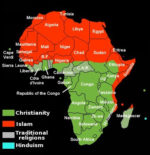By: Chip Stapleton on June 16, 2017
I read our assigned reading for this week, Christianity and African Traditions by Matthew Michael, with quite a bit of interest. The church I currently serve is about 50% Cameroonian, and as such, I often – on a weekly, sometimes even daily basis – see and try to account for and understand the intersection of our…
By: Geoff Lee on June 16, 2017
Following on from our earlier considerations of contextual theology and folk theology, this book looks at how to marry classic Christian theology in the Judeo-Christian tradition with specific African traditions and culture. Dr. Matthew Michael carries out a sweeping review of various systematic theological categories and considers how they fit in with and can be…
By: Kristin Hamilton on June 16, 2017
Whenever I read a book that analyzes another culture, especially one written by someone who has personal knowledge and understanding of that culture as well as a research knowledge, I know I am at a disadvantage from the start. Such is the case with Christian Theology and African Traditions by Matthew Michael. As Michael works…
By: Christal Jenkins Tanks on June 15, 2017
“Christianity has “a prefabricated theology, a book theology . . . what she reads in books written by European theologians. . .” and “what she is told by Europeans is accepted uncritically and given out undigested in preaching or teaching.”Similarly, the theological discourse of those times is characterized by unhealthy reactionary to Western misrepresentations of…
By: Stu Cocanougher on June 15, 2017
 When we think of traditional missions, we think of missionaries trekking jungles, mountains, and deserts in search of tribal people who have never heard the name of Jesus. Alternately, we may think of missionaries who share the good news with Muslims, Hindus, Buddhists, or Communists. Yet, there are some areas in today’s…
When we think of traditional missions, we think of missionaries trekking jungles, mountains, and deserts in search of tribal people who have never heard the name of Jesus. Alternately, we may think of missionaries who share the good news with Muslims, Hindus, Buddhists, or Communists. Yet, there are some areas in today’s…
By: Aaron Cole on June 15, 2017
Summary: Kaffir Boy, The True Story of a Black Youth’s Coming of Age in Apartheid South Africa, by Mark Mathabane is a sobering look at what it meant to grow up as a black male in the 1960’s and the 1970’s in abject poverty of Alexandria, South Africa during the Apartheid. Mathabane’s autobiography takes the…
By: Lynda Gittens on June 15, 2017
Christology Theology and African Tradition Christian Theology: Synonymous with the African individuals Must connect with human setting to stay important Isolate humankind detaches God Be theocentric and in addition human-centric Must connect with the perspectives of the African individuals (convictions, values and customary introductions) Be loyal to the Scriptures no reverberate of contemporary ideological ramblings…
By: Jennifer Dean-Hill on June 15, 2017
Throughout the pages of Matthew Michael’s book, “Christian Theology and African Traditions”, I was reminded of the many discussions of contextual theology and the words of Paul: “I have become all things to all people so that by all possible means I might save some” (I Cor. 9:22). What a beautiful reminder of our responsibility in…
By: Jim Sabella on June 15, 2017
In recent weeks the members of our cohort have read two books about Africa’s influence on Christianity. In the first book, Oden argues for Africa’s role in shaping present Christian thought. In this week’s reading Michael argues for an African theology that not only has the potential to inform the African church but also the…
By: Mary Walker on June 14, 2017
“The contention of this work is that Christian theology should encourage taking on the positive elements of the African traditions and positioning these elements in dialogue with the teaching of the scriptures.”[1] In his book, Christian Theology & African Traditions, Matthew Michael seeks to transform the African mind and its worldview and traditions to be…
By: Katy Drage Lines on June 11, 2017
When Kip and I moved to Kenya to work among the Turkana, we spent our first 12 months living in the remote village of Kangarisae, learning the language and culture of Turkana. It was in that little village where we first built relationships—with our language helper, the church leaders, and the elders—men and women—in the…
By: Kevin Norwood on June 9, 2017
What is the point of evangelism? Is it the salvation of the person that is being reached with the good news? When organizations send missionaries into all the parts of the world one of their goals is to evangelize those who have never heard the gospel message of the good news. They go through cultural…
By: Stu Cocanougher on June 9, 2017
 This September I will travel to Cape Town, South Africa for the second of three “on location” intensives with Portland Seminary. In preparation for this, I have been asked to read the book The Rise and Fall of Apartheid by David Welsh.1 This book is highly detailed, as it should be. The historical foundations for…
This September I will travel to Cape Town, South Africa for the second of three “on location” intensives with Portland Seminary. In preparation for this, I have been asked to read the book The Rise and Fall of Apartheid by David Welsh.1 This book is highly detailed, as it should be. The historical foundations for…
By: Jason Kennedy on June 9, 2017
In studying Christianity worldwide, Phillip Jenkins states in his book The Next Christendom: The Coming of Global Christianity: Assuming no great gains or losses through conversion, then there would be around 2.6 billion Christians, of whom 695 million would live in Africa, 610 million in Latin America, and 480 million in Asia. Europe, with 574…
By: Aaron Cole on June 9, 2017
Summary: Christian Theology and African Traditions by Matthew Michael is an insight read into the convergence of Christian history and the cultural and traditional effects of and upon African culture. Michael demonstrates how Western Christianity in particular has imposed its’ culture and tradition upon the African Church and has used theology as a vehicle…
By: Chip Stapleton on June 9, 2017
You probably familiar with the saying, ‘love means never having to say you’re sorry’. That phrase has never made any sense to me, and more than that, as I have grown up and learned more and experienced more of both loving and being loved, it has occurred to me that the exact opposite is closer…
By: Kristin Hamilton on June 9, 2017
I have been watching The Handmaid’s Tale, a television series with a modern take on the 1985 dystopian novel of the same name by Margaret Atwood. I read the original book some time ago, and this current series is equally as chilling if not more so. The bottom line question is this: How far will…
By: Christal Jenkins Tanks on June 8, 2017
“For to be free is not merely to cast off one’s chains, but to live in a way that respects and enhances the freedom of others.”[1] – Nelson Mandela In 1988, I remember sitting with my parents as we watched a concert with celebrities and singers such as Whoopi Goldberg, Whitney Houston, Tracy Chapman, Stevie…
By: Jennifer Dean-Hill on June 8, 2017
Unity makes or breaks a country… In summary of the recent read, “The Rise and Fall of Apartheid”, it appears that unity was the secret ingredient for the rise and fall of the South Africa apartheid. The lack of unity of Africans set a stage for an apartheid to take hold, in the same way,…
By: Phil Goldsberry on June 8, 2017
Introduction Why does this people group, denomination, socio-economic quota, or ethnicity get a pass? Can being from a certain continent give you a “green card”, “Get Out of Jail Free-card”, or “I can do what I want because I am __________ – card (You fill in the blank)”. After my rant, I reflected on my own…
 When we think of traditional missions, we think of missionaries trekking jungles, mountains, and deserts in search of tribal people who have never heard the name of Jesus. Alternately, we may think of missionaries who share the good news with Muslims, Hindus, Buddhists, or Communists. Yet, there are some areas in today’s…
When we think of traditional missions, we think of missionaries trekking jungles, mountains, and deserts in search of tribal people who have never heard the name of Jesus. Alternately, we may think of missionaries who share the good news with Muslims, Hindus, Buddhists, or Communists. Yet, there are some areas in today’s…
 This September I will travel to Cape Town, South Africa for the second of three “on location” intensives with Portland Seminary. In preparation for this, I have been asked to read the book The Rise and Fall of Apartheid by David Welsh.1 This book is highly detailed, as it should be. The historical foundations for…
This September I will travel to Cape Town, South Africa for the second of three “on location” intensives with Portland Seminary. In preparation for this, I have been asked to read the book The Rise and Fall of Apartheid by David Welsh.1 This book is highly detailed, as it should be. The historical foundations for…